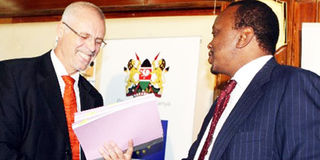Kenya and EU in Sh15.4 billion finance deal

Minister for Finance Uhuru Kenyatta (right) with Mr Eric Van Der Linden, European Union head of delegation in Kenya during the signing of the financing agreements in Nairobi on April 20, 2010. Photo/WILLIAM OERI
The government and the European Union on Tuesday signed six financing agreements that will see Kenya receive Sh15.4 billion with roads taking Sh10 billion.
This follows what Finance minister Uhuru Kenyatta called a long negotiation process between the two sides.
Importantly, the grant would benefit sectors that are critical to driving the economy, he said during the event at his Nairobi office.
“These are not peanuts,” said European head of delegation Eric van der Linden. “It is a grant therefore there is no indebtedness to Kenyans.”
Roads and Transport will get Sh790 million for technical assistance and sector policy studies.
There is a further Sh9.3 billion to upgrade 122 kilometres of Merille-Marsabit road.
This is expected to improve regional economic integration because the road is part of the Nairobi-Addis Ababa highway.
Mr van der Linden lauded Kenya for forming the Kenya National Highways Authority, Kenya Rural Roads Authority and Kenya Urban Roads Authority to manage, develop, rehabilitate and maintain highways, rural and urban roads, respectively.
“This creates independence and focused attention to roads,” he said.
To promote sustainable use of natural resources and improve livelihoods of the poor by developing schools and hospitals, the EU would provide Sh3.4 billion.
Private sector
And to assist private sector growth and competitiveness so as to accelerate economic growth and create employment, the EU will give Sh493 million.
A further Sh483 million will be granted to enhance cooperation between Kenya and the EU. Kenya would also get Sh966 million to address negative ethnicity, rebuild democracy and promote rule of law.
Local Government minister Musalia Mudavadi said that the biggest challenge the country faces is the ability and skills to manage new devolved structure under the proposed constitution.
“The EU’s support will prepare the country acquire the expertise and skills to manage the new reality when the new constitution comes into play,” he said during the meeting.
The new constitution would institute regional governments to distribute some of the activities undertaken centrally.
Mr Kenyatta said that the government was alarmed by huge amounts of money returned to the Treasury every year untouched.
He said Kenya is tackling this problem by ensuring that its officers fully understand requirements of different projects.
Mr Kenyatta, however, asked donors to simplify disbursement procedures for quicker implementation of projects.




